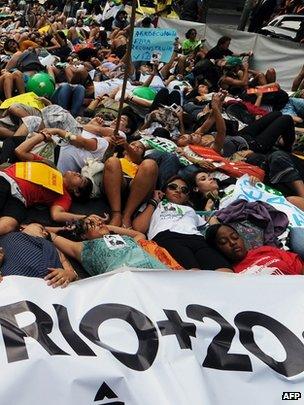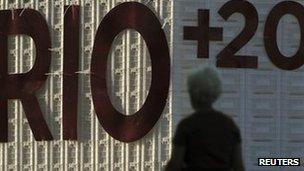Rio+20: Agreement reached, say diplomats
- Published
- comments

Environmental groups have already lamented the draft text's lack of commitments
Negotiators have agreed a text to be approved by world leaders meeting this week in Rio in a summit intended to put society on a more sustainable path.
Environment groups and charities working on poverty issues believe the agreement is far too weak.
The Rio+20 gathering comes 20 years after the Earth Summit, also held in the Brazilian city.
The text has yet to be signed off by heads of government and ministers, but it seems that no changes will be made.
"We have reached the best possible equilibrium at this point; I think we have a very good outcome," said Brazilian Foreign Minister Antonio Patriota.
"We consider that the spirit of Rio has been kept alive after 20 years."
However, the European Union was unhappy with the level of ambition in the text, in particular Denmark, which holds the EU presidency.
But Danish Environment Minister Ida Auken told BBC News that she believed it would be signed off.
"The EU would have liked to see a much more concrete and ambitious outcome, so in that respect I'm not happy with it," she said.
"However we managed to get the green economy on the agenda, and so I think we have a strong foundation for this vision that can drive civil society and the private sector to work in the same direction, to understand that environment and the social side must be integrated into the heart of the economy."
For the US, lead negotiator Todd Stern described the deal as "a good step forward", adding that he did not expect heads of state and government to re-open discussions.
"I believe this document is done," he said pointing out that Brazil has "no plan or intention to let the document open up."
Dismay
Environment and development groups are dismayed by many aspects of the agreement.

More than 100 leaders are expected to attend the summit from Wednesday
In large part, it merely "reaffirms" commitments nations have made previously.
Activists mounted a huge Twitter campaign on Monday in an attempt to persuade governments to commit to ending fossil fuel subsidies.
However the final text reaffirms previous commitments to phase them out if they are "harmful and inefficient", without setting a date.
The text calls for "urgent action" on unsustainable production and consumption, but it gives no detail or a timetable on how this can be achieved, and no clear direction as to how the world economy can be put on a greener path.
Developing countries might have agreed to go further it developed countries had offered tangible financial support, but it did not do so.
Several processes will be established leading from the summit. One will eventually establish sustainable development goals (SDGs), but there is nothing in the agreement on what they might promise.
The UK's environment minister, Caroline Spelman, praised the deal on SDGs as a "good outcome".
"We have backed SDGs from the outset and helped drive them from a good idea to a new agreement that will elevate sustainability to the top of the agenda."
The UN Environment Programme will be strengthened, but not fundamentally reshaped, as some governments, in particular the French and Kenyans, wanted.
Another process will eventually lead to new protection for the open oceans, including the establishment of marine protected areas in international waters, and stronger action to prevent illegal fishing.
Corporations will not be obliged to measure their environmental and social performance. They are merely invited to do so.
Missed opportunity?
Overall, observers here, as well as some government delegates, felt the world community has missed an opportunity to change the world's development track.
"This damp squib of a draft negotiating text makes it clear the Rio talks lack the firepower needed to solve the global emergency we're facing," said Friends of the Earth's director of policy and campaigns, Craig Bennett, in Rio.
"Developed countries have repeatedly failed to live safely within our planet's limits. Now they must wake up to the fact that until we fix our broken economic system we're just papering over the ever-widening cracks."
More than 100 world leaders are expected in Rio from Wednesday to attend the summit.
They include presidents and prime ministers from the large emerging economies, including China, India, Indonesia and South Africa.
But US President Barack Obama will not be there, and neither will UK Prime Minister David Cameron or German Chancellor Angela Merkel, who are all sending ministers in their places.

- What is the Rio summit about?







Follow Richard <link> <caption>on Twitter</caption> <url href="http://twitter.com/#!/BBCRBlack" platform="highweb"/> </link>
- Published19 June 2012
- Published17 June 2012
- Published16 June 2012
- Published15 June 2012
- Published14 June 2012
- Published13 June 2012
- Published12 June 2012